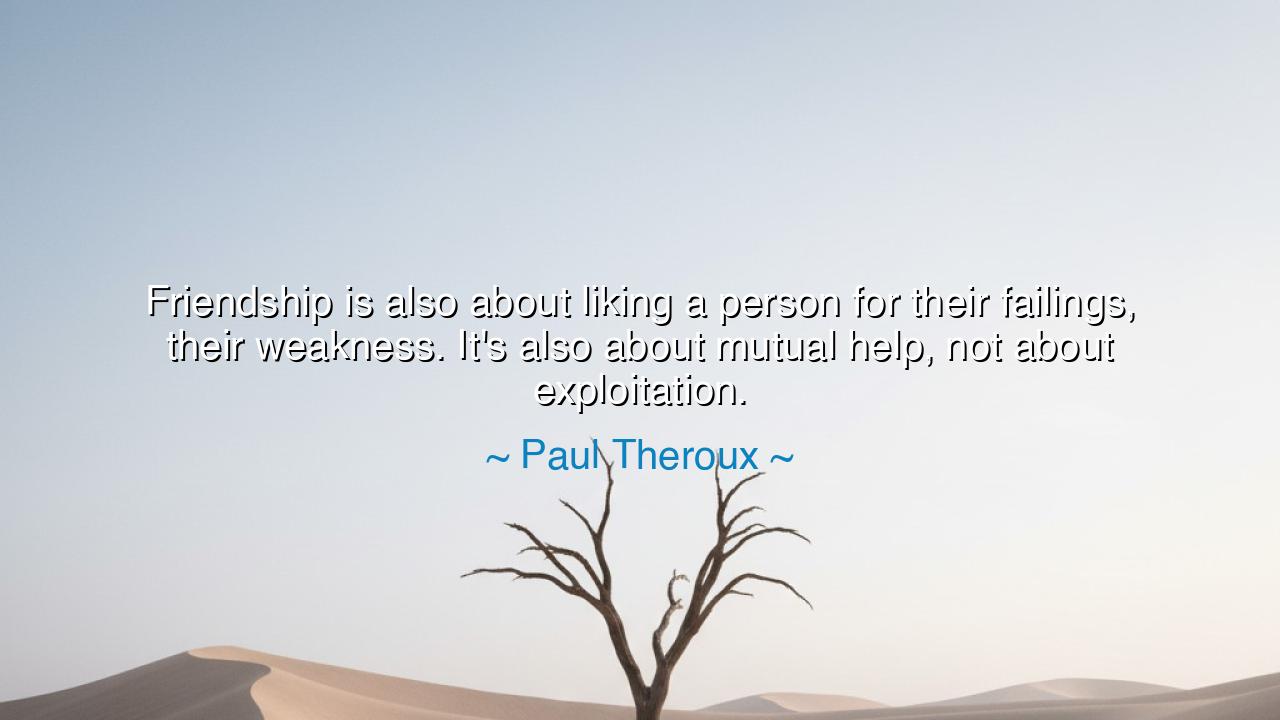
Friendship is also about liking a person for their failings
Friendship is also about liking a person for their failings, their weakness. It's also about mutual help, not about exploitation.






Hearken, O seekers of wisdom, to the words of Paul Theroux, whose insight reveals the profound essence of human companionship: “Friendship is also about liking a person for their failings, their weakness. It's also about mutual help, not about exploitation.” In this reflection lies a timeless truth: the heart of friendship is not perfection, nor is it self-interest; it is the embrace of another in their entirety, including their vulnerabilities, and the commitment to mutual care that uplifts both souls.
The origin of this insight flows from centuries of contemplation on human bonds. Philosophers from Aristotle to Montaigne understood that true companionship is rooted in virtue, trust, and empathy. Theroux reminds us that friendship is not a currency to be spent or manipulated; it is a sacred contract of the soul, in which each party accepts the other’s imperfections and lends strength where it is needed, fostering resilience, growth, and understanding.
Consider the enduring friendship between C.S. Lewis and J.R.R. Tolkien, two minds of brilliance, yet not without their weaknesses and idiosyncrasies. Their bond thrived not because they admired only each other’s strengths, but because they embraced each other’s quirks and vulnerabilities. In their fellowship, there was mutual encouragement, critique offered with care, and an unwavering commitment to the other’s development—illustrating Theroux’s principle that friendship is about support, not exploitation.
The essence of this teaching lies in recognizing that human beings are imperfect. To seek companionship only among those who exhibit flawlessness is to misunderstand the nature of connection. True friendship sees beneath the mask of perfection, embracing weaknesses and failings as part of the whole. It is in the acceptance of these imperfections that loyalty, empathy, and intimacy deepen, creating bonds that are unshakable in the face of life’s trials.
History offers further testament. Consider Abraham Lincoln and Joshua Speed, whose enduring friendship was forged amidst personal hardship and political turbulence. Both men had vulnerabilities—Lincoln’s melancholy, Speed’s emotional openness—but their companionship thrived because each accepted the other wholly and offered support without judgment or selfish gain. Theroux’s words find living proof in such alliances: true friendship is built upon empathy, acceptance, and mutual aid.
Theroux’s insight also illuminates a moral imperative: to cultivate genuine friendship, one must resist the temptation of using others for gain, flattery, or advantage. Exploitation corrodes the soul and poisons the bond. By contrast, relationships grounded in care, understanding, and the acknowledgment of each other’s imperfections flourish, sustaining trust, intimacy, and shared joy. Friendship becomes not a transaction, but a sacred exchange of strength and acceptance.
Practical guidance flows naturally from this wisdom: cherish companions not only for their strengths but for their vulnerabilities. Offer support generously, seek to understand rather than manipulate, and embrace honesty and empathy in all dealings. Let mutual aid and acceptance guide your friendships, for in honoring imperfection, you cultivate bonds that are resilient, profound, and life-affirming.
Thus, remember the teaching of Paul Theroux: friendship is the love of another in their wholeness, failings included, and the commitment to mutual help rather than exploitation. Treasure those who accept you as you are, and honor them with loyalty, empathy, and care. In this way, your bonds become a sanctuary of trust, a source of strength, and a reflection of the noblest virtues of the human heart.
If you wish, I can also craft a short, lyrical version suitable for audio narration, emphasizing the emotional resonance of accepting flaws and offering mutual support in friendship. Do you want me to do that?






AAdministratorAdministrator
Welcome, honored guests. Please leave a comment, we will respond soon